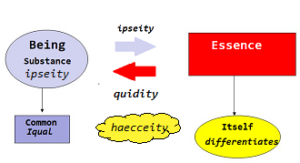
Arquivo para June 18th, 2025
Essence, substance and ipseity
So relativism isn’t just about philosophical or logical misunderstandings, its penetration into politics and science creates a distorted vision that goes deeper than dualism, which is part of even good philosophical and scientific references, it’s half-truths and therefore sophistry.
its penetration into politics and science creates a distorted vision that goes deeper than dualism, which is part of even good philosophical and scientific references, it’s half-truths and therefore sophistry.
The fact that science wants to unravel everything from the most microscopic state of nature to the infinite beyond of the entire cosmos is because we are still asking essential questions: what are we, what is matter and the entire universe made of, what are its dynamics and how did life begin.
Thus substance, since Aristotle, the pre-Socratics only speculated, is what subsists by itself, the substrate that supports the accidental qualities of everything that exists, one can think of it as a “first matter” and how it received form and characteristics.
It is present in the work Isagone of Portyphius ( with its famous tree of knowledge and that its interpreter and translator Boethius (480-524) proposes the question of whether particulars or universals exist, called by this the “quarrel of universals”, if we can create universal categories, the theme of essence and substance here can be reduced to: what it is? and what it has?.
The discussion that went on until the end of the Middle Ages, which thing (quid) is the essence or substance of everything, was approached by Duns Scotus (1265-1308), who called it haecceity, and was recovered by Heidegger, who reworked ontology based on phenomenology.
Essence, on the other hand, is the fundamental nature of something, what makes something what it is, thus the properties that define the identity of a being or object (thinking as an idealist), without which it would cease to be what it is, thus the discovery of the Higgs particle, for example, although it is something current, helps to answer this question and gives stability to the model of Standard Physics, but we are still stuck with the philosophical ideas of idealism and enlightenment.
We’ve already pointed out here that the idea is not the Greek eidos (derived from idein – to see), close to morphé (form in Greek), captured by the intellect as the infrastructure of a thing, thus linked to substance and in a way to essence, idealism transforms them into objectification.
So it’s not just meta-physics, it’s also physics and matter, but substance is linked to what the Greeks called hyle, which is matter, the substrate or the first matter, as we’ve heard.
Thus, essence does not refer to something material or objective, but rather to a subjective and ideal reality; this idea or concept is the form that precedes material existence, something very vague (res – thing).
Idealism brings pre-established concepts and forms, puts together a puzzle that is often abstract or just logical and makes it fundamental to describing all reality, but it doesn’t set out to search for the substrate or the essence of which it proposes, which is why it is ideology (reification).
The modern concept (used, for example, by Paul Ricoeur) of ipseity, its close to haecceity, according to him it allows him to establish a connection between originality and creativity of identity, themes that are so fundamental in contemporary times, remembering that the Other as well as narrative (Ricoeur, 2010) are themes that are very dear to the author (Deleuze also used it).
Haecceity does not refer to essence, subject or object, it is something individuated.
Ricoeur, P. (2010) Time and Narrative, Volume 3. Brazil, São Paulo: Martins Fontes (book in english: Time and Narrative, Chicago, USA: University Chicago Press, 1984).

